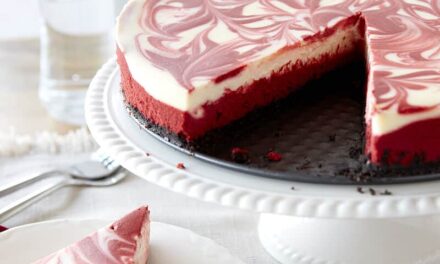A comprehensive guide to common baking substitutes for ingredients such as baking powder, baking soda, spices, sugar and more.
There’s nothing worse than being in the middle of baking cookies and realizing you don’t have all the ingredients you need. There’s no time for a trip to the store so, what’s a baker to do?
No need to scrap that recipe! In most cases, there’s a substitute you can use for everything from baking powder to eggs. While these swaps may change the taste, texture and appearance of your food, there’s no denying they can help save the day if you’re short on a necessary ingredient.
Egg Substitute for Baking
In addition to impacting the structure and moisture of your baked goods, eggs also affect the color, flavor and texture. For general baking, like muffins and cakes, you can use mayonnaise in place of eggs. Mayonnaise is actually made from eggs and does a great job of giving your cakes a fluffy texture. In a pinch, you can also use unsweetened applesauce or mashed banana.
Egg Substitutions (use one of these options):
- 3 tablespoons of mayonnaise
- ¼ cup unsweetened applesauce
- ¼ cup mashed banana
For recipes that require egg whites, such as meringues or macarons, you’re better off using real eggs or meringue powder, which is dehydrated egg whites

Butter Substitute for Baking
The good thing about fats is that you can generally swap one out for the other. Butter can be used in place of oil and visa versa. However, it’s a good idea to keep the fat in the state the recipe calls for, since liquid fats tend to produce a denser crumb. For example, if you need to replace oil, use melted butter. For room temperature butter, you can use vegetable shortening or margarine.
Butter Substitutions:
- If you don’t have butter (room temperature), use equal parts solid vegetable shortening
- For melted butter, use equal parts oil or melted vegetable shortening
Salted and unsalted butter are easily interchangeable, just tweak the amount of salt you add. If your recipe calls for salted butter, you can use unsalted butter and add ½ teaspoon of salt per 1 cup of butter. If you only have salted butter on hand, remove ½ teaspoon of salt from the recipe per 1 cup of salted butter.
Oil Substitutions:
- Vegetable oil – equal parts melted butter, melted vegetable shortening, applesauce or fruit puree
In most cases, you can also use coconut or olive oil in place of vegetable oil; however, keep in mind that those oils have very distinct flavors and my come through in your recipe.
Vegetable Shortening Substitutions:
- Vegetable shortening – equal parts butter or margarine (if using margarine, remove ½ teaspoon salt per cup of margarine from the recipe)
Flour Substitute for Baking
Perhaps one of the most difficult ingredients to swap when it comes to baking is flour. Flour creates the structure of your baked good, and breads and muffins have a different structure than pastries or cakes. It can be tricky, but it’s not impossible!
Flour Substitutions:
- 1 cup all-purpose flour – 1 1/3 cups cake flour or 1 cup bread flour
- 1 cup cake flour can be substituted by placing 1 cup all-purpose flour in a 1 cup measuring cup. Use a tablespoon to remove 2 tablespoons of cake flour, then replace with 2 tablespoons of cornstarch
- 1 cup bread flour – 1 cup all-purpose flour
- 1 cup self-rising flour – 1 cup all-purpose flour + 1½ teaspoons baking powder + ¼ teaspoon salt
Baking Powder, Cream of Tartar and Baking Soda Substitutes
Despite sounding similar, baking powder and baking soda are very different ingredients. They both help your baked goods to rise, however, baking soda needs to be activated by another acidic ingredient. Baking powder, on the other hand, already contains its own acid and does not need to be activated.
While they technically can be swapped out for each other, a few more additions are needed to insure they work correctly.
Baking Powder Substitution:
- 1 teaspoon baking powder – ¼ teaspoon baking soda + ½ teaspoon cream of tartar (for best results, bake immediately after batter is made)
Baking Soda Substitutions:
- 1 teaspoon baking soda – 1 teaspoon baking powder (if your recipe calls for an acidic liquid, such as sour cream, yogurt, buttermilk, vinegar, molasses or citrus, consider replacing it with equal amounts whole milk to avoid a more assertive, tangier flavor)
Cream of Tartar Substitutions:
- For baked goods, 1 teaspoon cream of tartar can be substituted with 1½ teaspoons of baking powder
- For whipping egg whites or making meringue, 1 teaspoon cream of tartar can be substituted with 2 teaspoons lemon juice or 1 teaspoon white vinegar

Sugar Substitutes for Baking
Much like fats, sugars should be swapped with an ingredient in the same physical state. This helps ensure your dough maintains consistency and doesn’t take on unwanted moisture.
Brown Sugar Substitutions:
- 1 cup dark brown sugar – 1 cup granulated sugar + 2 tablespoons molasses
- 1 cup light brown sugar – 1 cup granulated sugar + 1 tablespoon molasses
- Dark and light brown sugar can also be used interchangeably – just note that dark brown sugar has a richer molasses flavor than the lighter counterpart
Granulated and Confectioners’ Sugar Substitutions:
- 1 cup confectioners’ sugar (or powdered sugar) can be substituted by putting 1 cup granulated sugar and 1 teaspoon cornstarch in a blender and mixing until a fine powder forms
- 1 cup granulated sugar – 1¾ cup confectioners’ sugar or 1 cup firmly packed light brown sugar
Liquid Sugar Substitutions:
- 1 cup corn syrup – 1 cup honey or 1 cup granulated sugar + ¼ cup water
- 1 cup molasses – 1 cup honey, 1 cup dark corn syrup or 1 cup maple syrup (keep in mind that molasses does have a very distinct flavor, so be sure to increase your spices in the recipe to make up for the absence of molasses
Milk Substitutes for Baking
Milk products are often used to moisten and lighten up cakes and muffins. If you find yourself out of milk, the good news is there are lots of ways to substitute it!
Milk Substitutions:
- 1 cup buttermilk – 1 cup plain (not Greek) yogurt or 1 tablespoon lemon juice or vinegar + enough milk to make 1 cup (let the mixture sit for 10 minutes before using)
- 1 cup whole milk – 1 cup skim milk + 1 tablespoon melted butter
- 1 cup evaporated milk can be substituted by simmering 2¼ cups regular milk on low heat until reduced to 1 cup or ¾ cup whole milk + ¼ cup half-and-half
Other Dairy Substitutions:
- 1 cup plain yogurt – 1 cup sour cream or ¾ cup Greek yogurt + 3 tablespoons water
- 1 cup sour cream – 1 cup plain yogurt, ¾ cup buttermilk + 1/3 cup butter or by combining 1 tablespoon lemon juice or vinegar with enough heavy cream to make 1 cup
Substitutions for Spices and Salt
In general, common baking spices are pretty interchangeable. These can easily be adjusted to taste without changing the overall outcome of your baked goods.
Spice Substitutions:
- 1 teaspoon allspice – ½ teaspoon cinnamon + ¼ teaspoon ginger + ¼ teaspoon cloves
- 1 teaspoon cinnamon – ¼ teaspoon nutmeg or allspice
- 1 teaspoon cloves – 1 teaspoon allspice, cinnamon or nutmeg
- 1 teaspoon ginger – 1 teaspoon cinnamon, allspice or nutmeg
- 1 teaspoon mace – 1 teaspoon nutmeg or allspice
- 1 teaspoon pumpkin pie spice – ½ teaspoon ground cinnamon + ¼ teaspoon ground ginger + 1/8 teaspoon ground clove + 1/8 teaspoon nutmeg
Salt Substitutions:
If you’re just sprinkling salt on a finished dish, kosher grains and iodized salt can be used interchangeably. However, if you’re using salt in a baking recipe, it’s important to note that larger salt grains may have difficulty fully melting into breads and batters.
- ½ teaspoon iodized salt – ¾ teaspoon kosher salt (you can dissolve the salt in your liquid ingredient to help it break down fully)
- ½ teaspoon kosher salt – ¼ teaspoon iodized salt

How to Substitute Extracts, Chocolate and Other Flavoring Agents
When choosing another extract to swap in for vanilla, pick a flavor that will complement your recipe.
Vanilla Extract Substitutions:
- ½ vanilla bean – 1 teaspoon vanilla extract
- 1 teaspoon vanilla extract – ½ teaspoon almond extract or 1 teaspoon orange, lemon or peppermint extract
- Depending on your recipe, 1 teaspoon vanilla extract can also be substituted with 1 teaspoon bourbon or rum
Citrus Substitutions:
While vinegar works well to replace the tang of lemons in savory recipes, it can be overpowering if used in a baked good. Limes or oranges can be used in baking, as can white wine or cream of tartar.
- 1 teaspoon lemon juice – 1 teaspoon apple cider vinegar, 1 teaspoon white wine, 1 teaspoon lime juice, 1 drop of lemon extract or ½ teaspoon cream of tartar
- 1 teaspoon lemon zest – ½ teaspoon lemon extract, 2 tablespoons lemon juice or 1 teaspoon orange or lime zest
Chocolate Substitutions:
Although bittersweet and semisweet chocolate can be used interchangeably, take note that there might be a slight difference in flavor and texture.
- 1 oz. bittersweet chocolate – 1 oz. semi-sweet chocolate
- 1 oz. semi-sweet chocolate – 3 tablespoons unsweetened cocoa powder + 3 tablespoons sugar + 1 tablespoon butter or 1 oz. unsweetened baking chocolate + 1 tablespoon granulated sugar
- 4 oz. sweet baking (German) chocolate – ¼ cup unsweetened cocoa powder + 1/3 cup sugar + 1 tablespoon butter
- 1 oz. unsweetened chocolate – 3 level tablespoons unsweetened cocoa powder + 1 tablespoon butter
So if you’re in a pinch, don’t worry – there are plenty of ways to substitute for a missing ingredient! What other baking ingredients have you successfully swapped? Let us know in the comments below!






Would love to have a printable version of this… Can you think about that? Great information to put in the front of a recipe book etc…
Hello, thank you for your feedback. This is a feature we are currently looking into. 🙂
This will come in handy when you can’t go out because of cov-19. Thank you VERY much.
Hi Evelyn- We’re happy to hear that these substitutions can come in handy!
Very interesting and useful information! Thanks
Hi Julie- We’re so happy hear that you found this information useful! Happy baking. 🙂